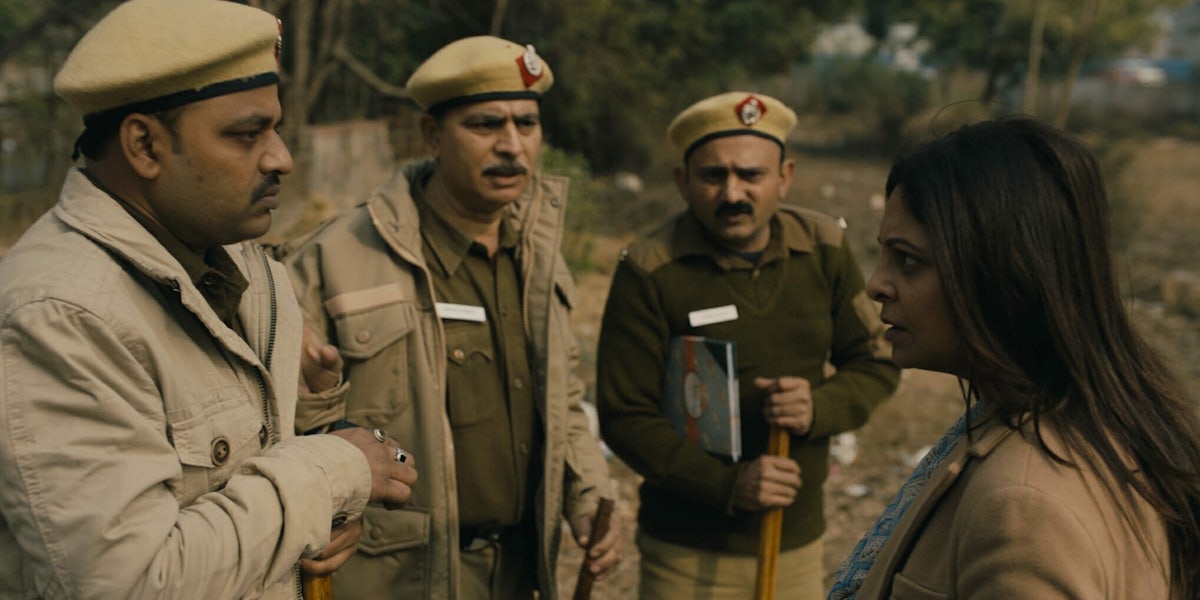Netflix’s latest foray into Indian culture—the compelling, if imperfect, Delhi Crime—is a fictionalized true-crime procedural that restores the basic essence of the police investigation of the infamous 2012 gang rape and murder of 23-year-old medical intern Jyoti Singh Pandey. Across seven emotionally charged, noir-influenced episodes, Indian-Canadian director Richie Mehta captures the gritty dynamics of Delhi and Indian politics, maintaining humanity while exploring the irrevocable horror of the brutal crime.
DIRECTOR: Richie Mehta
STREAMING: Netflix
This seven-part miniseries gives a fictionalized account of the 2012 Delhi gang rape of Jyoti Singh Pandey.
Prior to Delhi Crime, the Indian government swiftly banned a previous retelling of Jyoti’s murder: Leslee Udwin’s 2015 documentary, India’s Daughter. The well-reported production was revelatory, particularly in how the assailants’ attorneys insinuated that Jyoti was somehow to blame for the attack. The documentary’s ban was, at once, an avoidance of national shame and a curtailing of an outside-in examination of the country’s cultural mores regarding women’s rights to safety. (In a display of solidarity, television network NDTV India displayed a blank screen with the text “India’s Daughter” during the hour in which the film was scheduled to air.)
Mehta’s new, roundabout rehashing of the heinous crimes, committed by six attackers on a Delhi city bus, holds a light up to the clever, entertaining, and mostly overwhelmed company of investigators. The show mostly consists of composite characters, based on real people and events. The talented Shefali Shah plays the show’s lead, deputy commissioner of police Vartika Chaturvedi. A woman with a personal stake in cleaning up Delhi, partly to keep her perceptive and cynical daughter Chandni close to home, Chaturvedi serves as both the show’s wind and sail.
The show illuminates the deep cultural and religious differences within India, a country of 1.3 billion people, including one scene with a disagreement over a nearly slaughtered and cooked chicken. Delhi officers—strict vegetarians—visit the rural outskirts where the local police head offered the meal, which quickly devolves into near-calamity.
Delhi Crime also addresses the broad, knotty socioeconomics in India that made the crime possible. During a scene that notes the country’s widening inequality, an officer describes an India teeming with poor young males in a scarce job market, whose disastrous ideas about woman have been informed by gross miseducation and patriarchy.
“If they don’t get it, they take it, with no regard for the consequences,” he says. “After all, they have nothing to lose.”
One of the perpetrators being questioned sees the crime as punishment for how Jyoti and her boyfriend were carrying on. Ironically, he and the rest of the assailants saw the couple’s romance as uncouth. This could be read as the men punishing them for having the companionship they desired—or, more broadly, their jealousy that the couple had a future worth living for.
Moody and well-shot, Delhi Crime nevertheless ends up promoting an inadvertently sunny, Blue Lives Matter-esque message, with the hammer of justice’s supposed inevitability emerging as the prevailing theme. The problem, however, is that while the show mentions the monstrous crimes at every possible moment, it doesn’t tell Jyoti’s story in any meaningful detail. Perhaps she is supposed to represent the roughly 650 million women living in India, many of whom live in poverty in lower castes.
Conversely, Chaturvedi’s daughter—an affluent, forward-caste girl set on moving to Toronto—is granted tremendous range in pleading her case for leaving Delhi. Her privilege, of course, is part of Mehta’s blind spot. Although Delhi Crime serves as a noir story ultimately bent toward righteousness, at the series’ conclusion, it’s difficult to tell for whom justice will be served.
Still not sure what to watch tonight? Here are our guides for the absolute best movies on Netflix, must-see Netflix original series, documentaries, docuseries, and movies.
Need more ideas? Here are our Netflix guides for the best war movies, documentaries, anime, indie flicks, true crime, food shows, gangster movies, Westerns, and movies based on true stories streaming right now. There are also sad movies guaranteed to make you cry, weird movies to melt your brain, and standup specials when you really need to laugh. Or check out Flixable, a search engine for Netflix.
